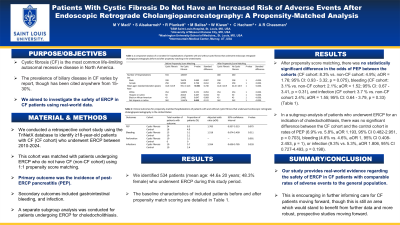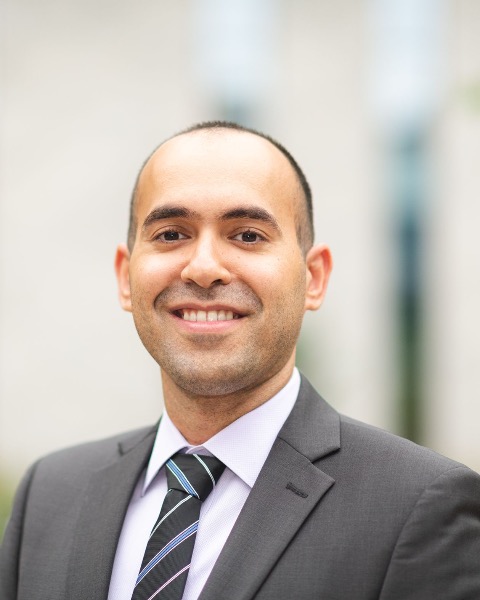Monday Poster Session
Category: Interventional Endoscopy
P2775 - Patients With Cystic Fibrosis Do Not Have an Increased Risk of Adverse Events After Endoscopic Retrograde Cholangiopancreatography: A Propensity-Matched Analysis
Monday, October 28, 2024
10:30 AM - 4:00 PM ET
Location: Exhibit Hall E


Mahmoud Y. Madi, MD
SSM Health Saint Louis University Hospital
St. Louis, MO
Presenting Author(s)
Mahmoud Y. Madi, MD1, Saqr Alsakarneh, MD2, Ryan Plunkett, MD3, Michelle Baliss, DO1, Wissam Kiwan, MD1, Christine Hachem, MD4, Antonio R. Cheesman, MD1
1SSM Health Saint Louis University Hospital, St. Louis, MO; 2University of Missouri - Kansas City School of Medicine, Kansas City, MO; 3Saint Louis University School of Medicine, St. Louis, MO; 4Saint Louis University Hospital, St. Louis, MO
Introduction: Cystic fibrosis (CF) is the most common life-limiting autosomal recessive disease in North America. The prevalence of biliary disease in CF varies by report, though has been cited anywhere from 15-30%. Endoscopic retrograde cholangiopancreatography (ERCP) is a useful diagnostic and therapeutic tool in hepatobiliary diseases, albeit not without risks. We aimed to investigate the safety of ERCP in CF patients using real-world data.
Methods: We conducted a retrospective cohort study using the TriNetX database to identify ≥18-year-old patients with CF (CF cohort) who underwent ERCP between 2010-2024. This cohort was matched with patients undergoing ERCP who do not have CF (non-CF cohort) using 1:1 propensity score matching. Primary outcome was post-ERCP pancreatitis (PEP). Secondary outcomes included gastrointestinal bleeding, and infection. A separate subgroup analysis was conducted for patients undergoing ERCP for choledocholithiasis.
Results: We identified 534 patients (mean age: 44.6± 20 years; 48.3% female) who underwent ERCP during this study period. After propensity score matching, there was no statistically significant difference in the odds of PEP between the cohorts (CF cohort: 8.3% vs. non-CF cohort: 4.9%; aOR = 1.76; 95% CI: 0.93 - 3.32, p = 0.075), bleeding (CF cohort: 3.1% vs. non-CF cohort: 2.1%; aOR = 1.52; 95% CI: 0.67 - 3.41, p = 0.31), and infection (CF cohort: 3.7 % vs. non-CF cohort: 2.4%; aOR = 1.55; 95% CI: 0.64 - 3.79, p = 0.33) (Table 1). These results were consistent across different sex and age groups. In a subgroup analysis of patients who underwent ERCP for an indication of choledocholithiasis, there was no significant difference between the CF cohort and the control cohort in rates of PEP (6.9% vs. 5.8%, aOR 1.193, 95% CI 0.482-2.951, p = 0.703), bleeding (4.6% vs. 4.6%, aOR 1, 95% CI 0.408-2.453, p = 1), or infection (9.3% vs. 5.3%, aOR 1.806, 95% CI 0.727-4.493, p = 0.198).
Discussion: Our study provides real-world evidence regarding the safety of ERCP in CF patients with comparable rates of adverse events to the general population. This is encouraging in further informing care for CF patients moving forward, though this is still an area with a paucity of research which would stand to benefit from further data and more robust, prospective studies moving forward.
Note: The table for this abstract can be viewed in the ePoster Gallery section of the ACG 2024 ePoster Site or in The American Journal of Gastroenterology's abstract supplement issue, both of which will be available starting October 27, 2024.
Disclosures:
Mahmoud Y. Madi, MD1, Saqr Alsakarneh, MD2, Ryan Plunkett, MD3, Michelle Baliss, DO1, Wissam Kiwan, MD1, Christine Hachem, MD4, Antonio R. Cheesman, MD1. P2775 - Patients With Cystic Fibrosis Do Not Have an Increased Risk of Adverse Events After Endoscopic Retrograde Cholangiopancreatography: A Propensity-Matched Analysis, ACG 2024 Annual Scientific Meeting Abstracts. Philadelphia, PA: American College of Gastroenterology.
1SSM Health Saint Louis University Hospital, St. Louis, MO; 2University of Missouri - Kansas City School of Medicine, Kansas City, MO; 3Saint Louis University School of Medicine, St. Louis, MO; 4Saint Louis University Hospital, St. Louis, MO
Introduction: Cystic fibrosis (CF) is the most common life-limiting autosomal recessive disease in North America. The prevalence of biliary disease in CF varies by report, though has been cited anywhere from 15-30%. Endoscopic retrograde cholangiopancreatography (ERCP) is a useful diagnostic and therapeutic tool in hepatobiliary diseases, albeit not without risks. We aimed to investigate the safety of ERCP in CF patients using real-world data.
Methods: We conducted a retrospective cohort study using the TriNetX database to identify ≥18-year-old patients with CF (CF cohort) who underwent ERCP between 2010-2024. This cohort was matched with patients undergoing ERCP who do not have CF (non-CF cohort) using 1:1 propensity score matching. Primary outcome was post-ERCP pancreatitis (PEP). Secondary outcomes included gastrointestinal bleeding, and infection. A separate subgroup analysis was conducted for patients undergoing ERCP for choledocholithiasis.
Results: We identified 534 patients (mean age: 44.6± 20 years; 48.3% female) who underwent ERCP during this study period. After propensity score matching, there was no statistically significant difference in the odds of PEP between the cohorts (CF cohort: 8.3% vs. non-CF cohort: 4.9%; aOR = 1.76; 95% CI: 0.93 - 3.32, p = 0.075), bleeding (CF cohort: 3.1% vs. non-CF cohort: 2.1%; aOR = 1.52; 95% CI: 0.67 - 3.41, p = 0.31), and infection (CF cohort: 3.7 % vs. non-CF cohort: 2.4%; aOR = 1.55; 95% CI: 0.64 - 3.79, p = 0.33) (Table 1). These results were consistent across different sex and age groups. In a subgroup analysis of patients who underwent ERCP for an indication of choledocholithiasis, there was no significant difference between the CF cohort and the control cohort in rates of PEP (6.9% vs. 5.8%, aOR 1.193, 95% CI 0.482-2.951, p = 0.703), bleeding (4.6% vs. 4.6%, aOR 1, 95% CI 0.408-2.453, p = 1), or infection (9.3% vs. 5.3%, aOR 1.806, 95% CI 0.727-4.493, p = 0.198).
Discussion: Our study provides real-world evidence regarding the safety of ERCP in CF patients with comparable rates of adverse events to the general population. This is encouraging in further informing care for CF patients moving forward, though this is still an area with a paucity of research which would stand to benefit from further data and more robust, prospective studies moving forward.
Note: The table for this abstract can be viewed in the ePoster Gallery section of the ACG 2024 ePoster Site or in The American Journal of Gastroenterology's abstract supplement issue, both of which will be available starting October 27, 2024.
Disclosures:
Mahmoud Madi indicated no relevant financial relationships.
Saqr Alsakarneh indicated no relevant financial relationships.
Ryan Plunkett indicated no relevant financial relationships.
Michelle Baliss indicated no relevant financial relationships.
Wissam Kiwan indicated no relevant financial relationships.
Christine Hachem indicated no relevant financial relationships.
Antonio Cheesman indicated no relevant financial relationships.
Mahmoud Y. Madi, MD1, Saqr Alsakarneh, MD2, Ryan Plunkett, MD3, Michelle Baliss, DO1, Wissam Kiwan, MD1, Christine Hachem, MD4, Antonio R. Cheesman, MD1. P2775 - Patients With Cystic Fibrosis Do Not Have an Increased Risk of Adverse Events After Endoscopic Retrograde Cholangiopancreatography: A Propensity-Matched Analysis, ACG 2024 Annual Scientific Meeting Abstracts. Philadelphia, PA: American College of Gastroenterology.
